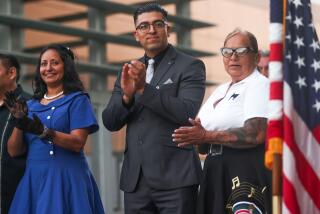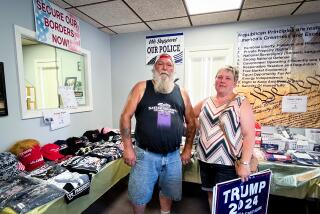Now Voters Play Their Hands in Card Club Issue
- Share via
BELLFLOWER — Bellflower voters go to the polls Tuesday to decide whether they will allow a card club in their city, amid political conflict-of-interest charges, rumors of a tax increase and a blizzard of campaign flyers.
The initiative has been the subject of the ugliest campaign in recent memory, and with a Bell Gardens casino footing part of the bill to squash it, it has caught voters’ attention. Already more absentee ballots have been cast than in any other city election.
The casino measure was placed on the ballot by the City Council at the request of the Cougar Club, a group of 53 business people and politicians who propose building a $40-million card parlor on Lakewood and Artesia boulevards, just off the Artesia Freeway (91).
Mayor Bob Stone and Mayor Pro Tem Ken Cleveland have been accused of having a conflict of interest because they voted to put the measure on the ballot although they appeared to have financial ties to Cougar Club partners.
An inquiry into the allegations has been referred to the Los Angeles County district attorney’s office for criminal investigation. Prosecutors asked the Fair Political Practices Commission, which had been looking into the charges, to turn over the case to them, said FPPC spokeswoman Jeanette Turvill.
Although Turvill said the case was sent to prosecutors July 8, the district attorney’s office would not confirm whether it is investigating.
Days before the initial council vote, Turvill advised Cleveland to abstain from voting on the issue, she said, because he had recently been in a business partnership with Cougar Club partner Virginia Boggs. Cleveland disregarded the advice, saying, “I’ve searched my heart, big time, and I just don’t think there is a problem.”
Stone’s possible conflict arises from his wife’s job as a real estate agent affiliated with Boggs’ office.
Meanwhile, Bellflower residents have been inundated with a blizzard of campaign literature describing the Cougar Club either as the city’s financial redemption or a magnet for prostitution, drugs, gangs and corruption.
In addition, voters are being told by club proponents they can either accept a card parlor or pay a hefty new utility user’s tax.
The choice--gambling or taxes--is a false one, however, said Acting City Administrator Linda Lowry.
City staff is proposing a 5% utility user’s tax to pay for at least nine more sheriff’s deputies to patrol exclusively in Bellflower, Lowry said. The city now shares deputies with Lakewood, Artesia and Hawaiian Gardens, but Lakewood has threatened to pull out of the joint contract because of an increasing number of police calls to Bellflower. Without the joint contract, Bellflower’s law enforcement bill would skyrocket, Lowry said.
Therefore, Bellflower must raise at least $1.5 million within a few months, Lowry said. And though the Cougar Club has promised it could pump up to $10 million a year into city coffers, that would not happen until the club is built and successfully operating, Lowry said. “Unless the card club can materialize like a mushroom overnight, we will still have to implement this new tax,” Lowry said.
Pro-casino forces have spent $268,876 putting up signs and distributing brochures and flyers, most of them linking a no vote with increased taxes.
“Homeowners, Renters Demand: ‘Don’t Stick Us With This Tax’,” was the headline on one campaign paper put out by Responsible Citizens of Bellflower/Yes on A.
“If the city had the kind of revenue they would get coming from the card club, they wouldn’t need that tax,” said Jack Stanaland, Cougar Club partner. “It’s a matter of how quickly the city moves on various things.”
The pro-casino group had raised $401,438 by July 28, according to its campaign disclosure statement. Of that, $400,713 came from the Cougar Club’s partnership.
Casino proponents also have mounted a massive campaign to distribute absentee ballot applications. So far, the City Clerk’s office has received more than 7,500 applications, given out nearly 6,000 absentee ballots and received 2,874 completed ballots. The last election that received so much voter attention was in 1988, when voters were asked to approve a redevelopment plan. In that election, 2,261 absentee ballots were received.
A citizen’s coalition, No on A: The People Speak, led by Councilwoman Ruth Gilson, has spent $2,930 to fight the measure, mostly for flyers that link card clubs to robbery, loan sharking and corruption. No on A had raised $4,359.37 by the end of July’s reporting period.
But that is not the only opposition in town.
Four other groups have distributed signs and brochures, either accusing Cleveland and Stone of voting for a profit or warning residents of increased crime.
California Sports, Entertainment and Gaming Assn. spent $5,965 through July to put out flyers linking card clubs to murder, suicide, drugs, corruption, gangs and addiction.
This group is financed by the Bicycle Club card casino in Bell Gardens and George Hardie, the club’s general manager, according to campaign disclosure statement filed with the county.
Club proponents have said Hardie has financed the opposition because he fears competition for his club.
Though Hardie claims that his Bicycle Club has helped reduce crime in Bell Gardens, the brochures offer a list of vices, then asks Bellflower voters, “Do you really want this gambling scheme in our city?”
Hardie declined to comment.
Another flyer shows two scantily clad women on a curb, one leaning in a car window, with the headline: “We don’t need anymore of this in Bellflower.” These brochures produced by Hardie’s group are similar--sometimes identical--to campaign flyers distributed in Pico Rivera, Stanton and Cypress during those cities’ recent card club elections.
Lists of contributors to the three other casino opposition groups were not available, but two of them--Alliance for Safe Communities and Residents to Protect Our Neighborhoods--shared the same Los Angeles treasurer as Hardie’s group, according to campaign statements filed with the city clerk’s office.
Out-of-town anti-casino forces had spent nearly $68,700 on their campaign, as of July 29.
More to Read
Sign up for Essential California
The most important California stories and recommendations in your inbox every morning.
You may occasionally receive promotional content from the Los Angeles Times.













